|
|
|
Sort Order |
|
|
|
Items / Page
|
|
|
|
|
|
|
| Srl | Item |
| 1 |
ID:
083585


|
|
|
|
|
| Publication |
2008.
|
| Summary/Abstract |
With the price of oil crossing $110 a barrel, the oil-importing countries' concerns have been mounting. Not surprisingly, the issue of whether the time is now ripe for energy consuming countries to take measures to counter the producers' growing clout is being discussed, including the formation of a consumers' cartel, to force exporters to bring down prices. This paper looks at attempts by consumers to counter the growing clout of the producers, whether such attempts will succeed or whether they will exacerbate the divisive trends that have recently surfaced in the international energy market.
|
|
|
|
|
|
|
|
|
|
|
|
|
|
|
|
| 2 |
ID:
089840


|
|
|
|
|
| Publication |
Verlag, Wiley-VCH, 2009.
|
| Description |
xvi, 251p.
|
| Standard Number |
9783527324460
|
|
|
|
|
|
|
|
|
|
|
|
Copies: C:1/I:0,R:0,Q:0
Circulation
| Accession# | Call# | Current Location | Status | Policy | Location |
| 054323 | 333.7915/COC 054323 | Main | On Shelf | General | |
|
|
|
|
| 3 |
ID:
062126
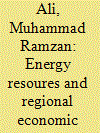

|
|
|
| 4 |
ID:
127208
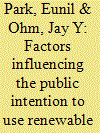

|
|
|
|
|
| Publication |
2014.
|
| Summary/Abstract |
The Fukushima accident has influenced public attitudes toward energy sources and technologies, including not only nuclear energy, but also other energy sources. Therefore, it is worth investigating how the accident influenced public perceptions of renewable energy and its technologies, between the time before the accident and after the accident. This study aims to explore the effects of the Fukushima accident on the public perceptions of renewable energy technologies in South Korea, the closest nation to Japan. This study found that there were notable differences of public perceptions, including public attitudes, perceived benefits, trust, intention to use, knowledge and risks between before and after the earthquake. In addition, the perceived cost of renewable energy technologies was the primary determinant of the intention to use the technologies before the accident, whereas public attitudes toward the technologies became the main antecedents of the intention after the accident. After the accident, we found that there is a multi-dimensional matrix of perceived trust-benefits (with risks)-attitude-intention to use, in explaining the public acceptance of renewable energy technologies. Moreover, we found significant roles of the perceived trust, benefits and risks in the research model. Based on the empirical findings, both implications and suggestions are presented.
|
|
|
|
|
|
|
|
|
|
|
|
|
|
|
|
| 5 |
ID:
127202


|
|
|
|
|
| Publication |
2014.
|
| Summary/Abstract |
The present work aims to examine the strategic decision of future electricity generation mix considering, together with all other factors, the effect of the external cost associated with the available power generation technology options, not only during their operation but also during their whole life cycle. The analysis has been performed by integrating the Life Cycle Assessment concept into a linear programming model for the yearly decisions on which option should be used to minimize the electricity generation cost. The model has been applied for the case of Greece for the years 2012-2050 and has led to several interesting results. Firstly, most of the new generating capacity should be renewable (mostly biomass and wind), while natural gas is usually the only conventional fuel technology chosen. If externalities are considered, wind energy increases its share and hydro-power replaces significant amounts of biomass-generated energy. Furthermore, a sensitivity analysis has been performed. One of the most important findings is that natural gas increases its contribution when externalities are increased. Summing-up, external cost has been found to be a significant percentage of the total electricity generation cost for some energy sources, therefore significantly changing the ranking order of cost-competitiveness for the energy sources examined
|
|
|
|
|
|
|
|
|
|
|
|
|
|
|
|
| 6 |
ID:
083616


|
|
|
|
|
| Publication |
2008.
|
| Summary/Abstract |
Many have linked the US-led invasion of Iraq to its oil resources, leading some observers to question Caspian energy prospects. This article analyzes how the Iraqi occupation and Caspian oil prospects have been inter-linked, via the evolution of American and Turkish assessments of Iraq and the Caspian region. It shows that, contrary to initial expectations, the occupation of Iraq bolstered the Baku-Tbilisi-Ceyhan project as well as a number of other increasingly significant natural gas export pipelines
|
|
|
|
|
|
|
|
|
|
|
|
|
|
|
|
| 7 |
ID:
020806
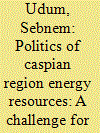

|
|
|
|
|
| Publication |
Dec 2001-Feb 2002.
|
| Description |
36-60
|
|
|
|
|
|
|
|
|
|
|
|
|
|
|
|
| 8 |
ID:
083282
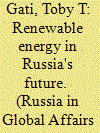

|
|
|
|
|
| Publication |
2008.
|
| Summary/Abstract |
If the focus of Russian political leadership continues to be on gas and oil production and if the state budget continues to rely heavily on tax revenues from these industries, there will be few incentives to innovate and develop new resources on a significant scale
|
|
|
|
|
|
|
|
|
|
|
|
|
|
|
|
| 9 |
ID:
078453


|
|
|
| 10 |
ID:
129707
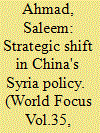

|
|
|
|
|
| Publication |
2014.
|
| Summary/Abstract |
The Arab region is a significant exporter of energy resources for China's expanding economy in the world. Moreover, it serves as an area in which China can demonstrate its rising "international status and influence" which was traditionally dominated by the United States. The outbreak of the Syrian crisis in March 2011 posed serious challenges for Chinese foreign policy. China has also supported the UN Mission in Syria and Kofi Annan's plan, but vetoed three UNSC Resolution on Syria, pointing to its foreign policy principle of "Libyan experience", where the military intervention overthrew the Qaddfi's regime, and subsequent instability badly undermined Chinese economic interests. However, China's manoeuvring approach like talks with the Syrian opposition, supporting some of the UN initiatives, and opposing sanctions, is aimed at preventing the "domino effect", strengthening relations with other states in the Arab region, and asserting China's international significance.
|
|
|
|
|
|
|
|
|
|
|
|
|
|
|
|
| 11 |
ID:
123896


|
|
|
|
|
| Publication |
2013.
|
| Summary/Abstract |
THE NEW U.S. SECRETARY OF ENERGY, Ernest Moniz, did not make much of an impression on the Senate Committee that was engaged in confirming him. A question from a Republican senator whether the new Secretary had plans to develop an oil-bearing continental shelf so as to remove the "dependence" of Europe on Russian oil remained unanswered. Moniz also dodged the question about the development of the huge reserves of natural gas in Alaska. The impression was that, despite the achievements that in a short time have let the U.S. come close to energy independence and set the stage for exporting its own energy resources, the Secretary did not have a well-thought-out program for developing the country's energy sector.
|
|
|
|
|
|
|
|
|
|
|
|
|
|
|
|
|
|
|
|
|